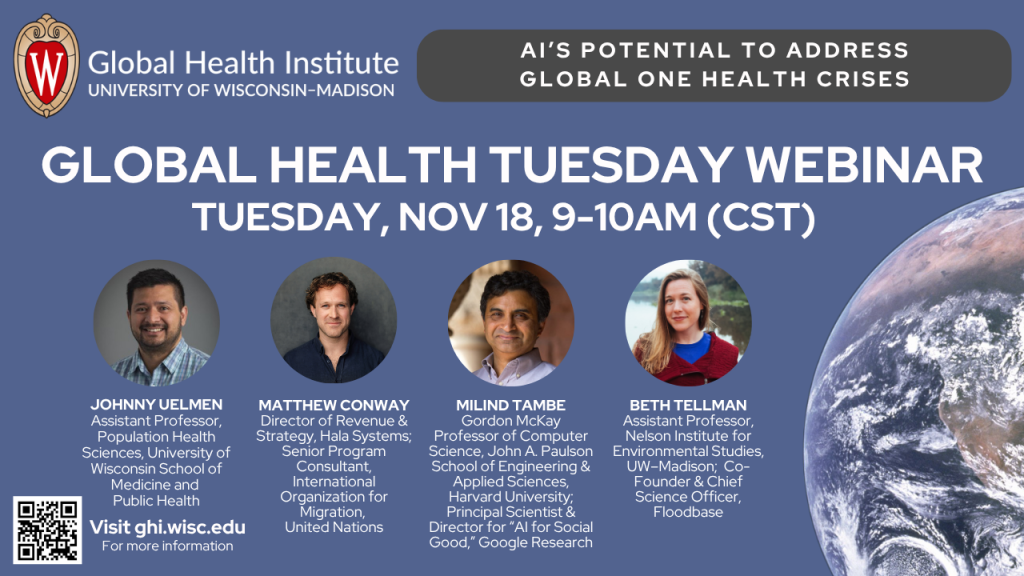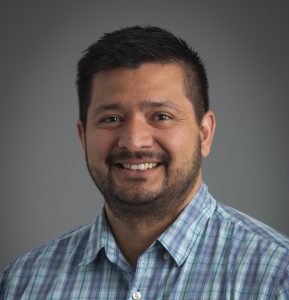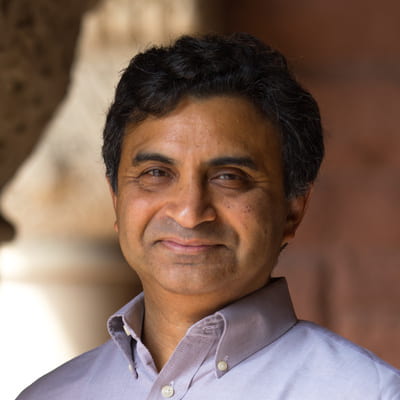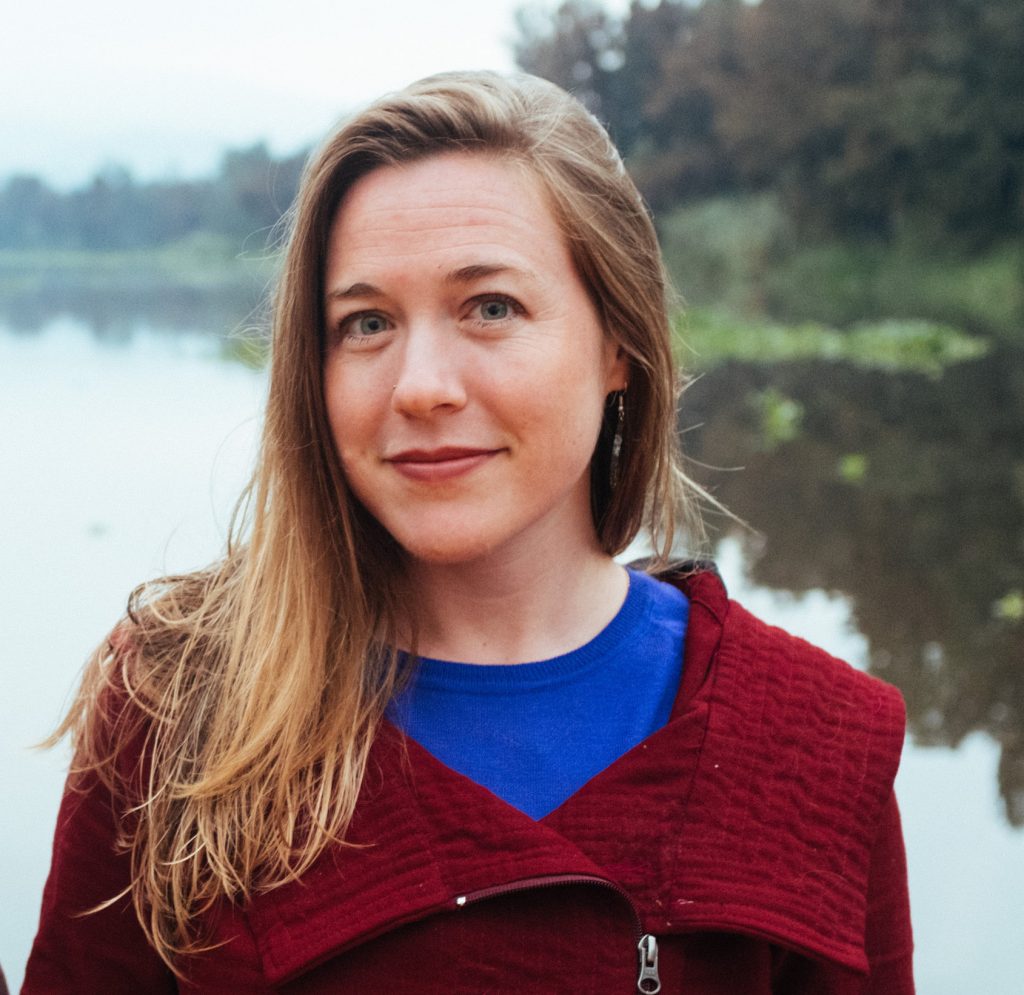
The Global Health Institute’s November Global Health Tuesday Webinar was Tuesday, November 18, 2025, discussing AI’s Potential to Address Global One Health Crises.
Moderator, Johnny Uelmen, Assistant Professor, Population Health Sciences, University of Wisconsin School of Medicine and Public Health, led the timely discussion with panelists Matthew Conway, Director of Revenue & Strategy, Hala Systems and Senior Program Consultant, International Organization for Migration, United Nations; Milind Tambe, Gordon McKay Professor of Computer Science, John A. Paulson School of Engineering & Applied Sciences, Harvard University; Principal Scientist and Director for “AI for Social Good,” Google Research ; and Beth Tellman, Assistant Professor, Nelson Institute for Environmental Studies, UW–Madison and Co-Founder & Chief Science Officer, Floodbase.
Find a link to the recording on our YouTube Channel.
MEET THE MODERATOR:

JOHNNY UELMEN, Assistant Professor, Population Health Sciences, University of Wisconsin School of Medicine and Public Health
Johnny Uelmen is an Assistant Professor of Population Health Sciences, in the School of Medicine and Public Health at the University of Wisconsin-Madison. He is a proud triple Badger, completing a B.S. (Evolutionary Biology) and two M.S. (Entomology & Epidemiology) degrees before completing a Ph.D. in Epidemiology in the Department of Pathobiology in the School of Veterinary Medicine at the University of Illinois Urbana-Champaign. He completed his postdoctoral studies in the Martin Lab within the Department of Epidemiology in the School of Public Health at the University of Michigan and also the Carney Lab within the Department of Integrative Biology in the School of Arts and Sciences at the University of South Florida. He was then Assistant Director for the Triangle Center of Evolutionary Medicine (TriCEM) at Duke University before coming to Wisconsin.
Johnny’s research focuses on evaluating and forecasting zoonotic disease risk in humans and animals, particularly at the nexus of changing climates and environments. Under a One Health lens, he leverages a multidisciplinary approach to identify disease hotspots, forecast risk, and devise targeted interventions to break disease transmission cycles. He uses a myriad of statistical methods and advanced tools, such as spatiotemporal modeling, GIS, machine learning, and artificial intelligence, to identify key pieces in a complex, ecological puzzle; to improve understanding of the complexities of disease ecology to increase preparedness and mitigate the global health burden on humans, animals, and ecosystems, while also promoting long-term and sustainable conservation efforts. You can view The Uelmen Disease Ecology Lab here.
MEET THE PANELISTS:

MATTHEW CONWAY, Director of Revenue & Strategy, Hala Systems; Senior Program Consultant, International Organization for Migration, United Nations
In Matthew Conway’s role with the UN’s migration agency (IOM), he supports IOM’s emergency health and stabilization programming in Ukraine, Lebanon, and the Democratic Republic of Congo, with a focus on mental health. He is also Director of Strategy at Hala Systems, a social enterprise that applies artificial intelligence and advanced analytics to strengthen humanitarian response, civilian protection, and accountability for human rights violations.
Matthew’s career includes emergency response management with the United Nations (IOM, WFP); policy development and research on displacement contexts with the World Bank; and national security and global health policy roles with the U.S. Department of State and the White House. His international experience spans Senegal, The Gambia, Lebanon, Jordan, Syria, Iraq, Ecuador, Mozambique, Ukraine, and the Democratic Republic of Congo.
He holds a B.A. in Political Science and International Studies from the University of Wisconsin–Madison and an M.A. in Conflict, Security, and Development from King’s College London. His current work explores the intersection of AI, humanitarian action, and global health resilience, particularly in conflict and displacement contexts.

MILIND TAMBE, Gordon McKay Professor of Computer Science, John A. Paulson School of Engineering & Applied Sciences, Harvard University; Principal Scientist and Director for “AI for Social Good,” Google Research
Prof. Tambe and his team have developed pioneering AI systems that deliver real-world impact in public health (e.g., maternal and child health), public safety, and wildlife conservation. He is recipient of the AAAI Award for Artificial Intelligence for the Benefit of Humanity, AAAI Feigenbaum Prize, IJCAI John McCarthy Award, AAAI Robert S. Engelmore Memorial Lecture Award, AAMAS ACM Autonomous Agents Research Award, INFORMS Wagner prize for excellence in Operations Research practice, Military Operations Research Society Rist Prize, Columbus Fellowship Foundation Homeland security award and commendations and certificates of appreciation from the US Coast Guard, the Federal Air Marshals Service and airport police at the city of Los Angeles. He is a fellow of AAAI and ACM.

BETH TELLMAN, Assistant Professor, Nelson Institute for Environmental Studies, UW–Madison; Co-Founder & Chief Science Officer, Floodbase
Beth is an Assistant Professor at the University of Wisconsin Madison, in the Nelson Institute for Environmental Studies, and is the co-founder and Chief Science Officer at Floodbase. She engages in multiple disciplines and methods to “socialize the pixel” or understand the social processes behind environmental change captured in satellite image pixels and leverage satellite data to improve human well-being. Her research seeks to address the causes and consequences of global environmental change, with a focus on flood risk and land use change. Beth co-founded an NGO in Mexico, Umbela, to promote transformation from Global South Perspectives. Beth is passionate about co-producing knowledge with actors outside academia to achieve social impact. She completed her PhD, advised by Dr. B.L. Turner II and Dr. Dr. Hallie Eakin, in 2019 in the School of Geographical Sciences at Arizona State University. Hear about her journey and research philosphy in this University of Arizona podcast from January 2021 .
